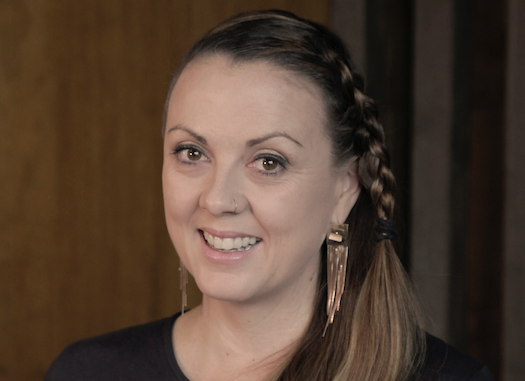Fyona Smith speaks with Peter Saxon
For the past 34 years a diploma from the highly respected radio course at AFTRS would all but guarantee the holder a job in the industry.
The other week, that notion suffered a serious blow when SCA announced that 18 of its entry level stations’ local Breakfast shows would be axed in favour of state-wide shows networked from provincial hubs.
The news came as a shock, of course, to the young Brekky teams who suddenly found themselves out of work along with too many of their colleagues and too few jobs on offer. The shock waves reverberated through many other corners of the radio industry.
“I think it was a sad day for everybody involved.” AFTRS Head of Radio, Fyona Smith, told radioinfo. “My career’s been built in regional radio and I personally know many people who have been affected by the change.”
Her start was on the Central Coast of NSW at 2GO as the Road Runner. Before she joined the team at AFTRS, almost nine years ago, Ms Smith had worked at Southern Cross Austereo as national music director for the Triple M local works network. “I was an announcer as well as TV presenter based on the Gold Coast and doing a national networked show at night. So, a lot of my career I grew up in what is the company now known as Southern Cross Austereo.”
Naturally, many students who enrolled in one of the courses at AFTRS to follow their dream of a career in radio were heartbroken at the news that their chances had been diminished. A few of them spoke to radioinfo on condition of anonymity.
One told us, “Coming up on AFTRS 3rd broadcast AFTRSfm, and hearing the news that not only did so many great radio talent, some I personally know, lost their jobs, but that my opportunities had drastically shrunk and competition for a role on air had grown substantially. It was also frustrating to see localism be struck down in so many regional towns and further syndication to save pennies. However we are in unprecedented times, and I have hope some of these jobs will come back once COVID passes but I fear other networks will follow suit and this is an omen for the future of Australian radio.”
Another said, “My dream was to go into an on air role, probably firstly in a regional town. Then I would see where the radio journey would take me. I really have no plans besides stepping my foot inside the first studio that would have me.”
We’ll have more of what the students told us in an article about losing your job and mental health to be published later this week on radioinfo.
On hearing the news about show being axed, Ms Smith went into bat on behalf of her students.
“I spoke with Gemma Fordham Head of Content for the HIT Network) the morning after the news was announced. I was in touch to talk about the fact that over half our current cohort aspired to work in the commercial regional radio sector. We wanted to have a conversation around their next five-year plan and opportunities that might be coming up. Whilst some of their (student) aspirations may need to change, for those that wanted to be working at a HIT regional station on breakfast, we know SCA plans to continue to add to their workforce in other areas.”
Ms Smith reminds us that, “Radio has always been very agile and very resilient and able to adapt to changing circumstances.”
While some entry doors to radio closed the other week many new one have been opened in recent years in areas such as web content and design ans social media.
“I remember when social media first came out,” recalls Ms Smith, “radio stations banned you from being able to actually log into it at work, and yet now there are people who solely work in that space in the industry, creating content as a job. So, I think this is a moment in time where there are new and emerging roles that we will see into the future.
“A decade ago, we wouldn’t have been teaching students the back end of websites and how to create and publish content for social media platforms, but now we do. Also, our students can shoot, edit and publish video content. They also have photoshop skills. They learn photography because we know that those skills were identified as necessary for emerging roles five years or so ago.
“And maybe some of those traditional roles, particularly for SCA regionally, have disappeared on the HIT network but they are still keeping their Triple M network hyper- local at the moment and we know that Grant and Capital have continued to hold their Local teams in local markets and deliver local, live radio.”
And what of the future?
Ms Smith tells us, “I anticipate that we’re still going to see changes that will be needed to be made to set up our students well into the future. For example, this year our students at AFTRS are creating narrative audio dramas which is a first for the Graduate Diploma Radio. They’re working with binaural microphones and creating radio fiction, basically, or by another name, depending on what platform it plays on! And we know that that’s an area that is offering employment.
“We’ve got graduates in our course who left three years ago who are now making narrative audio dramas for Audible. We’ve got people working as full time podcast producers in radio as well as for other big brand organisations like Mamamia.
“So, we still know that the opportunities are there. They just might be a little bit different than expected by people who are very passionate and have had really long careers in radio. Some of these roles might be outside of the realm of what they were thinking.
“We consult regularly with the industry and I guess my calls to Gemma at the HIT network this week was sparked by their announcement, but we are always in touch with our industry advisory panels with members from all sectors. We consult with the commercial sector, the public sector with SBS and ABC and also the independent podcast sector as well regularly to make sure that what we’re teaching is really setting our students up for what’s next.”
And a final word from Ms Smith…
“For anyone who is wanting to upskill and considering studying applications for 2021 are open now.”

Peter Saxon
Subscribe to the radioinfo flash briefing podcast on these platforms: Acast, Apple iTunes Podcasts, Podtail, Spotify, Google Podcasts, TuneIn, or wherever you get your podcasts.



